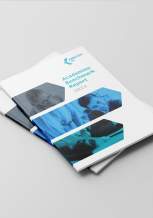With more than 200 members in our Academy team, we've got the capacity and expertise to meet your needs.
Education
Education Accounting Services
The Education sector is ever-changing where every educational institution will need to regularly review and update its strategy, to ensure it is providing an educational environment where children and students come first.
We are the number one auditor for Multi Academy Trusts and have a clear understanding of the many practical challenges educational institutions face on a day-to-day basis. Working closely with our clients, we use our knowledge of the legal and financial requirements within the sector to deliver tailored advice and guidance alongside our financial accounting and auditing work.
How we can help you with education expertise


Audit and Accounts
At Bishop Fleming, we don’t like to think of the audit as just a necessity - for us it’s a way to increase our understanding of your academy, to identify potential weaknesses and to determine how we can help, providing increased security for you and your school.
We take a risk-based approach to auditing which means we focus on areas of most risk to your organisation.
The service we deliver matches strict compliance requirements with your need to run a successful organisation. This means minimising any disruption caused by the audit process, and maximising the potential to bring you meaningful insights on activities and financial controls.
You can expect us to provide:
- A flexible easy-to-use audit service that’s technically strong
- An organised approach with a timetable, year end file, proforma documents and guidance notes
- Annual training
- A quality management letter with practical recommendations based on extensive experience
- Electronic audit files minimising paper usage. This may be a new process for the school and we can guide you through it step by step
- The best expertise available in the region.
Most academy clients also come to us for support in putting their accounts in statutory format. We are often tailoring our approach to hand hold our clients through this process.


Internal Audit
We can offer you a number of areas of support, providing pragmatic, solution-focussed, clear and easily understood advice. We’ll provide you with assurance that everything you think is being done “on the ground” to stop your risks becoming a reality actually is happening in practice!
We can help you by:
- Working with you to assess and strengthen how you monitor, manage and steer your business;
- Helping you reinforce your risk management, governance and internal control environment;
- Providing training, advice and related support to boards, audit committees and senior teams to enable and evolve your own assurance frameworks, so you know how well you are mitigating risks in practice;
- Delivering the more traditional core internal audits of risks and controls – from pure internal compliance to wider risk-based, assurance focussed audits;
- Carrying out more bespoke specific advisory reviews to help you answer particular questions, for example to demonstrate regulatory or contractual compliance in practice, or focussing on the efficiency or effectiveness of one of your functions or services;
- Helping set-up or tailor your risk register/maps, widening this out to fuller assurance “stocktakes” / mapping, facilitating risk workshops and training, implementing and strengthening your organisation-wide risk management systems, processes and culture;
- Providing wider governance advisory reviews, including reviews of effectiveness, structure, reporting, culture and accountability, as well as tailored training for your board, audit committee and management team. We also provide sector specific training - for example, tailored for academies, charities, trustees


Governance
Governor training
We offer bespoke governor training to suit your particular needs. The training is developed in-house and is delivered by one of our specialist academy team members. Our training covers a range of topics, some of which include: understanding the new funding streams, a review of the academies financial handbook, setting financial policies, and understanding the governors report. Our training can be delivered at a time to suit you, as a separate training session or as part of a governors’ meeting.
Accounting Officer training
The role of the accounting officer is an important one and so it is essential that you fully understand the requirements of the role. Our training provides guidance in respect of the role and responsibilities of the accounting officer, the reporting requirements, and the evidence required to support the annual statement. This training can be tailored to suit your needs or alternatively, we have a standard training session which we have developed in-house.


Audit Committees
Every academy must have in place a process for independent checking of financial controls, systems, transactions and risks. The hand book states this should be driven by an audit committee, but The Education Skills and Funding Agency (ESFA) recognise in this new handbook that this may not be a practical proposition for every academy, especially for those that are smaller or where there is a limited pool of potential trustees to provide the necessary direction.
The ESFA has, therefore, introduced a system which allows some flexibility as to how trusts discharge these requirements. This means that all academies must establish either:
- A dedicated audit committee; or
- A committee whose remit includes the functions of an audit committee. This could be an addition to the terms of reference to an existing committee, such as a finance committee, and have an overlapping or fully integrated membership.
- Multi academy trusts with an income of over £10 million or capitalised asset value of over £30 million must have an audit committee (previously, it was a requirement that all single academies over these limits also had to have a dedicated audit committee).
For all other academies under these limits:
- Multi-academy trusts should consider having a dedicated audit committee; and
- All other academy trusts may have a dedicated audit committee.
- The relevant committee must review the risks to internal financial control at the academy and must agree a programme of work that will address these risks, to inform the governance statement that accompanies the trust’s annual accounts and, so far as is possible, provide assurance to the external auditors.
It is important that the academy considers the role of the accounting officer when setting their programme of work. This will assist the accounting officer when gathering evidence to enable them to sign their annual statement on regularity, propriety and compliance.
At Bishop Fleming we have extensive experience of advising our academy clients on all aspects relating to an audit committee, including advising on the terms of reference, how to run an effective function and advising on best practice.


Academy school conversion support
We provide a full-service offering to academy schools including non-audit and audit support services pre conversion, during conversion and post conversion. We have helped over 150 academies through the conversion process and would be delighted to talk to you about your school’s situation and how our conversion support services can be tailored to your specific needs.


Accounting Software and Support
Academies have a unique set of requirements when it comes to financial management and reporting. This means fundamental differences are required in financial arrangements and processes from local authority maintained schools and any choice of accounting system needs to be able to handle these changes. The system should be able to:
- Deal with charity fund accounting for the production of statutory accounts
- Provide accurate reports and audit trails to support the statutory audit process
- Provide timely and accurate management reporting for the governors
- Converting to academy status can also have a large impact on the school’s finance team due to changes in working practice and additional responsibilities. It is therefore important to have the correct accounting system in place that is configured in the best possible way to minimise disruption for the finance team.
Bishop Fleming has experience of the core accounting systems that are used across the academy sector. This means that we can provide help and support no matter which system is appropriate for you. Across our client base, FMS is the widest used, followed by Civica, PS Financials and Sage. Most maintained schools will have used FMS with their local authority and therefore take the decision to remain with the familiar system, thus removing one of the additional hurdles of conversion.
We can offer support with most aspects of accounting systems, but in particular:
- Assisting with the selection of the most appropriate system for your academy
- Assisting with the configuration of your nominal ledger, fund accounting and cost centres whether implementing a new system or converting your existing one
- Assisting with the content and production of management information and
- Assisting with the production of year end reports and close down.
- With our help, from an early stage, you will be better equipped to manage the finances of your academy.


Corporation and Employment Tax Issues
Academies face several tax issues including corporation and employment tax issues. Most academy schools will be constituted as a company limited by guarantee which have charitable objects in their articles. For tax purposes they are charities, although this does not mean that they will never pay tax!
There are significant exemptions within the tax legislation but these are not automatic blanket exemptions. It is important that academies understand the limits of the exemptions and how they must organise their affairs to ensure they benefit.
Registration with HMRC
Once formed the academy needs to register with HMRC. This includes completion of a registration form (ChA1) but also the charity needs to ensure that all its managers are “fit and proper persons”.


Pensions
All academies have complicated pension arrangements. Through our experience and knowledge of this area we can help your academy understand its responsibilities regarding pension schemes.
All academies have complicated pension arrangements. The teachers’ are members of the Teachers Pension Scheme (TPS), other staff may be members of the Local Government Pension Scheme (LGPS), have separate personal pension schemes, or have no pension provision at all.
Both the TPS and LGPS pension schemes are defined benefit schemes which are more commonly known as final salary schemes. If you read any media comment on these types of schemes then you will be aware that most are in a deficit position and so need significant further funding. This funding will need to come from the employer, which is now the academy, and so there are potentially major expenses facing academies over which they have very little control. There are likely to be further changes to both the TPS and LGPS pension schemes as they move away from the more generous pension based upon final salary to a career average salary.
The number and size of the pension schemes that academy employers are members of creates a great deal of complexity and adds a lot of administrative burden to Business Managers and their teams. Through our experience and knowledge of this area we can help you understand the obligations and commitments created by the pension arrangements. We can ensure that you are able to comply with the legislative requirements and more importantly, understand the impact that the schemes have on your academy, both in terms of the financial commitment and cash flow impact, and how these are disclosed in your financial statements.
The services that we offer are:
- End of Year Certificate (EOYC) pension audit and submission for the TPS scheme
- Review of LGPS submissions
- Review of actuarial returns for LGPS scheme to assess the assumptions used
- Assist trustees in understanding the deficit position and the cash flow impact of clearing this liability and
- Preparation of the financial statement disclosures associated with the defined benefit pension schemes.


VAT
Academies have a special VAT regime under s 33B of VAT Act 1994 which allows them to recover VAT which relates to their non-business activity of providing free education to their pupils funded by the Education Skills and Funding Agency. However, they also need to consider whether VAT registration may be required if their taxable business supplies exceed the VAT registration threshold.
How does an academy reclaim VAT?
An academy which is not VAT registered can submit a VAT 126 claim to HMRC in order to recover input VAT incurred on their non-business activities. Any VAT incurred on purchases relating to business activities must be excluded. An invoice schedule must be provided, which will include details of the supplier and their VAT number.
VAT 126 claims must cover a minimum period of at least one calendar month and are subject to a four year time limit from the date of the supply.
If an academy is VAT registered (see below) then the academy will make their claim using an electronic VAT return. Ordinarily these need to be completed on a quarterly basis, however an academy may request to submit monthly returns.
A VAT registered Academy will also pay output VAT on its VAT return in respect of any taxable business activities and will also be able to reclaim the VAT which relates to these supplies.
Our expert approach
A good number of our specialist team sit on various Trust Boards and steering groups, and the long-standing relationships we’ve built with the Department for Education and the Education and Skills Funding Agency give you a direct connection to people who are actively helping shape the future of the sector.
Our specialist charity, education and not-for-profit team works with over 1,100 academy primary schools, secondary schools, colleges and multi-academy trusts throughout the UK, as well as a number of free schools, alternative provision academies, special schools, studio Schools and UTC's.
Bishop Fleming is a current supplier on the Crescent Purchasing Consortium framework.

Members of our team are representatives on the ESFA Academies finance and assurance Working Group 3, who support the ESFA Steering Group in its work programme to enable the ESFA, DFE and Academy Trusts to work collaboratively.
This gives us insight into the ESFA and DfE’s strategic aims and we are able to share our knowledge with our clients on the implications of new areas of policy and delivery and long term aims. Our involvement includes contributing to the recently published Academy trust financial management good practice guides and the Internal scrutiny in academy trusts guide.
Types of Schools we advise


Multi Academy Trusts (MAT)
As advisers to 130 Multi-Academy Trust clients, we understand the opportunities, risks and pitfalls of operating as a Multi-Academy Trust.
We are seeing a number of new conversions in the form of a MAT, plus existing single academies which are either joining forces with other academies or taking on other schools who are wanting to convert.
The legal structure of a MAT is one legal entity (exempt charity and company limited by guarantee). Within a MAT all academies are governed by one Trust (the Members) and a board of Directors (the Governors/Trustees). There must be at least three Members, who may be Governors from predecessor governing bodies, foundation bodies or trusts, bringing with them the ethos of the constituent schools. The MAT holds ultimate responsibility for all decisions regarding the running of the individual academies, from setting the curriculum to HR. However, it can delegate some or even most of these decisions to governing bodies of individual academies to enable more focused local control, though it remains legally responsible for standards across all schools in the chain.
There are many advantages of forming a MAT including:
- Sharing of resources – one employer means resources can be moved between schools more easily
- Cost savings as contracts can be re-negotiated
- Improving the pupil experience at individual schools
- Flexibility over governance models
- Cash flow (particularly for small schools).


Single Academy Trusts (SAT)
A single academy is the simplest type of academy. It consists of one school in a charitable company. The academy is an exempt charity and a company limited by guarantee.
Most schools converting since the Academy Act 2010 was passed will be converter academies. However, some academies, generally those set up to replace underperforming schools, will have a sponsor.
Single academies receive the same level of per-pupil funding as they would receive from the local authority as a maintained school, plus additional income to cover the services that are no longer provided for them by the local authority. However, academies have greater freedom over how they use their budgets to best benefit their students.
Schools looking to convert should read the steps to becoming an academy on the Education Skills and Funding Agency (ESFA) website.


Independent Schools
We provide advisory services to independent schools and Governance advisory in addition to Trustee training and Charity/Director responsibilities where applicable.


Higher Education/Further Education
We have a number of clients in the further education sector, and audit more further education colleges than any other firm in the South West. We continue to invest in developing our team to provide an added value service delivered by sector specialists, we have a large and growing external audit client base within the HE/FE sector, and we have also worked with other colleges providing assurance services, such as reviews of subcontractor arrangements and grant audits for colleges.
We can provide you with both a specialist and responsive service.






